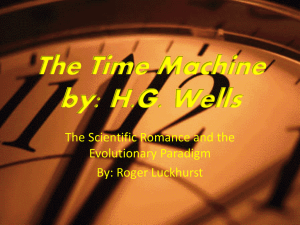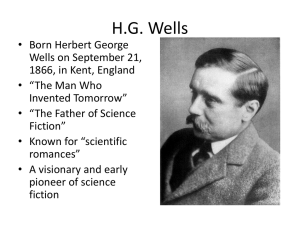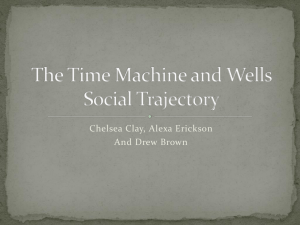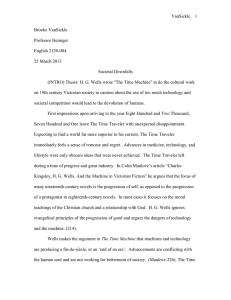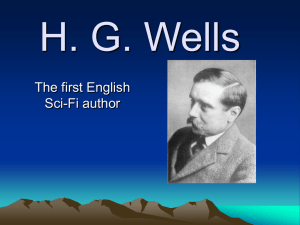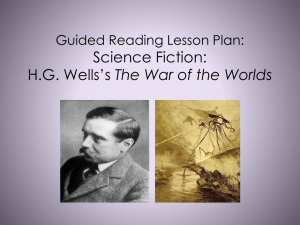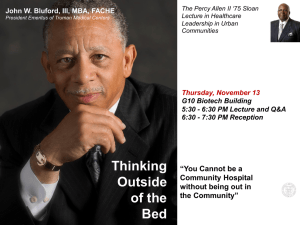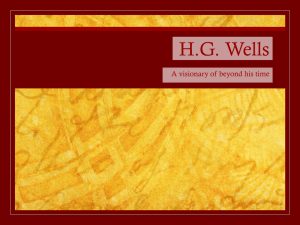The Scientific Romance and the Evolutionary Paradigm
advertisement
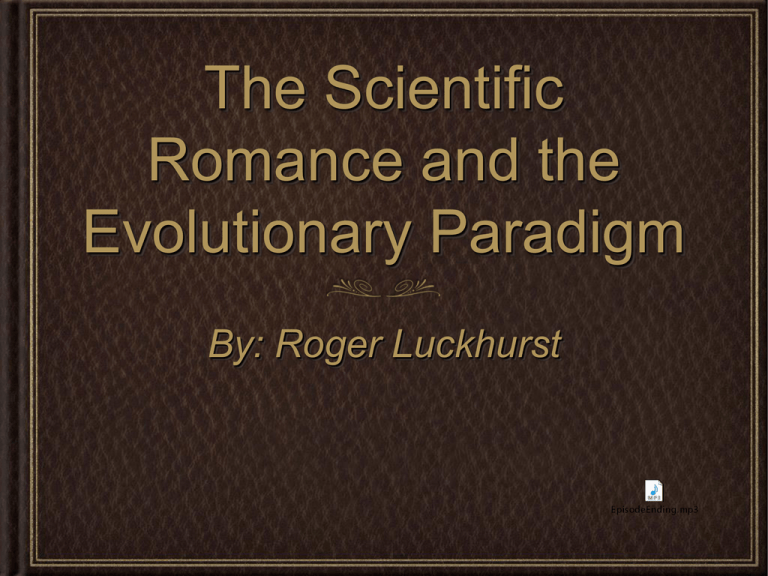
The Scientific Romance and the Evolutionary Paradigm By: Roger Luckhurst Roger Luckhurst He is a professor of modern and contemporary literature at Birkbeck University of London. He published The Invention of Telepathy, 1870-1901. Co-edited The Fin de Siècle. Major Points “Wells was to forge a scientized framework for his fiction and political writings and the evolutionary paradigm that dominated the English scientific romance before, and to some extent after, 1945. (Luckhurst, 253) The fusion of biological science and masculine romance, propounded by Andrew Lang and Rider Haggard, was directly borrowed by Wells from the writer Grant Allen. (Luckhurst, 253) Grant Allen Grant Allen (continued) Privately funded the publication of his first book, Physiological Aesthetics. Allen opened up the field for Wells’ scientific romances. Many people didn’t agree with it either, people believed that if you were going to write science fiction then keep it to science fiction and don’t incorporate romances. Allen then turned to daily journalism before his health pushed him into professional freelance journalism from 1880. From then on until his death in 1899. Allen produced a mass body of reviews, essays, scientific journalism, anthropological monographs, Spencerian speculations, short stories, Realist novels, detective fiction and Gothic shilling shockers, etc. Herbert Spencer Herbert Spencer (continued) The advancement of Herbert Spencer’s grand plan was to synthesize all human knowledge into a developmental schema. Herbert Spencer came up with the idea of natural selection and survival of the fittest. Nicholas Ruddick’s view “Allen opened up the field for Wells’ scientific romances.” (Luckhurst 253) Edward Clodd Clodd said, “Allen had been contemptuous of the fiction markets for which he wrote, and abandoned all pretence at serious art after the failure of his three-volume novel Philistia in 1884. Further Vision “But the ‘Further Vision’ embraces genuine evolutionary time by conceiving of a post human future.” (Luckhurst, 255) “Wells exploits the suggestive brevity of the romance form to evoke the radical difference of the future, yet does so from strict scientific premises.” (Luckhurst, 255) What is a Paradigm? –noun • • a. a set of forms all of which contain a particular element, esp. the set of all inflected forms based on a single stem or theme. 1. an example serving as a model; pattern. —Synonyms • 2. mold, standard; ideal, paragon, touchstone Paradigm The Travelers first theory was when he watched the sunset. The second theory is sustained progress towards a Utopia of Communism, gender equality and sexual differentiation. The Traveler commits to Spencerian dogma of human striving and restless intellectual by saying it is a biological imperative for the utopia. Paradigm (continued) Edward Bellamy (writer of Looking Backward), stated that technological progress would end labor strife and cause un-alienated communality by the year 2000. “Such Elisions seem to make biology an overmastering motive knowledge” The Travelers Visions of Utopia “The Time Traveler compares himself to a bewildered African”. (Wells 34) This showed that it was a sign that the anchor was uprooted and the traveler finds savage energy for the struggle to survive as human descendants in the form of Morlocks without peace. Eloi The Eloi had lack of intelligence and descended down the evolutionary ladder as the Morlocks became monstrous in a typical form of fin de Siècle. This gave further evidence that the Eloi were now the oppressed prey of their own servants. The Traveler was torn between siding with the Eloi and longing to identify with the Morlocks. Final Quote “The Traveler only sketches his moralistic degenerationism on to the cosmos making the end of the world a rather local, late Victorian affair. It is a view the frame narrator encourages us to discard ‘Live as though it was not so’.” (Wells 71)
